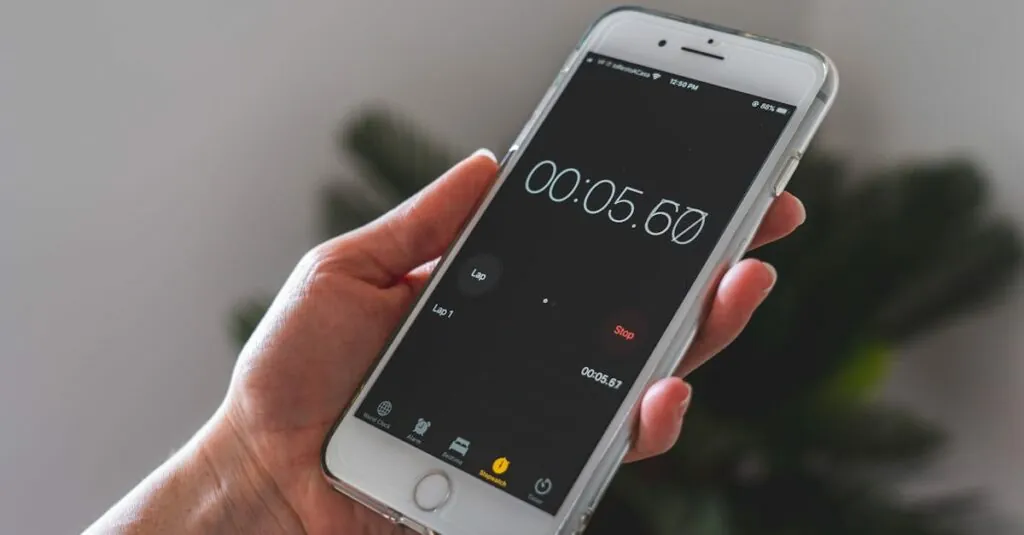Table of Contents
TogglePicture this: it’s a beautiful morning, the sun’s shining, and your alarm clock has decided to take a vacation. If you’ve ever found yourself staring at your iPhone in disbelief, wondering why your alarm didn’t ring, you’re not alone. Many have faced this mysterious dilemma, and it’s as frustrating as trying to find a matching sock in a laundry pile.
From silent settings to software glitches, the reasons can be as varied as the snooze button’s tempting allure. But fear not! Understanding why your alarm isn’t ringing can save you from waking up late and missing that important meeting or brunch date. Let’s dive into the quirky world of iPhone alarms and uncover the secrets that might just bring your wake-up call back to life.
Common Reasons Why My Alarm Is Not Ringing iPhone
Numerous factors can affect an iPhone alarm’s functionality. Understanding these issues ensures users wake up as expected.
Volume and Sound Settings
Volume settings play a critical role in alarm activation. Users must check the ringer and alert volume to confirm they are set to an audible level. Inconsistent volume levels may cause alarms to sound too quietly or not at all. Additionally, if the phone is muted or switched to silent mode, alarms won’t ring. Ensuring that the alarm sound is selected and not set to “None” is essential for optimal performance.
Do Not Disturb Mode
Do Not Disturb mode can prevent alarms from ringing at the designated time. Users often activate this setting without realizing the implications for alarms. In this mode, alarms should still sound, but notifications might be silenced. Disabling Do Not Disturb or confirming that the alarm is set to bypass this feature ensures alarms function as intended.
Alarm Time and Frequency
Incorrectly set alarm times can lead to missed wake-ups. Users must confirm that the alarm is set for the correct day and time. Multiple alarms set for different times can sometimes create confusion. Setting alarms to repeat on specific days is a helpful feature, but reliance on this functionality means checking the schedule regularly to avoid any mishaps.
Troubleshooting Steps
Start by systematically checking common issues that might prevent an iPhone alarm from ringing.
Check Alarm Settings
Ensure the alarm settings are configured properly. Verify that the alarm is turned on and set to the correct time. Choose a specific sound for the alarm instead of leaving it on “None.” Adjust the volume levels, as low ringer and alert volume could silence the alarm. Also, check for multiple alarms; having overlapping alarms can create confusion.
Restart Your iPhone
Restarting the iPhone can resolve minor glitches that affect alarm performance. Hold down the side button and either volume button until the slider appears, then slide to power off. Wait a few moments, then press the side button again until the Apple logo appears. This process refreshes the device and may restore the alarm functionality.
Update iOS
Installing the latest iOS version fixes bugs and improves performance, including alarm features. Access the Settings app, then select General and Software Update to check for available updates. If an update exists, follow the prompts to download and install. Keeping the software up to date prevents issues related to older versions that might affect alarm settings.
Other Factors Affecting Alarm Functionality
Multiple factors can influence whether alarms ring as expected on an iPhone. Understanding these elements helps ensure alarms perform reliably.
Third-Party Apps
Some third-party applications can interfere with alarm functionality. Applications that manage notifications or sound settings occasionally disrupt system alarms. Users might find that certain apps silence notifications altogether, causing alarms to be overlooked. Checking individual app settings for permissions and notifications may resolve conflicts. It’s crucial to test alarms after adjusting app settings to confirm expected behavior.
Battery and Power Issues
Battery performance plays a significant role in the reliability of alarms. If the battery runs low, the iPhone might limit functionality to conserve power, affecting alarm performance. Ensure the device charges regularly to avoid these issues. Power-saving modes can also impact alarm behaviors, leading to missed alarms. Users should monitor battery health settings to maintain peak performance.
Dealing with an iPhone alarm that doesn’t ring can be frustrating but understanding the common causes can make a significant difference. By checking settings like volume and Do Not Disturb mode users can often resolve the issue quickly. Regularly updating the iOS and monitoring battery health are also essential steps to ensure alarms function properly.
Additionally users should remain mindful of third-party apps that might interfere with alarm settings. By taking these proactive measures users can enhance their chances of waking up on time and avoid the stress of missed alarms. With a little attention to detail alarm reliability can be restored, ensuring a smoother start to each day.








